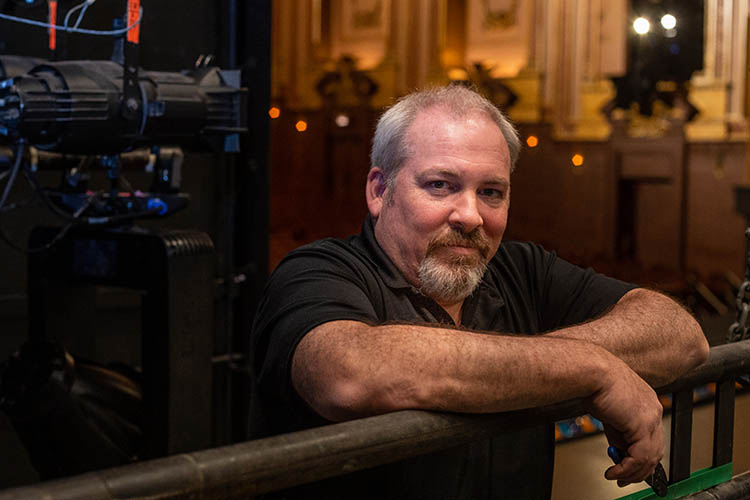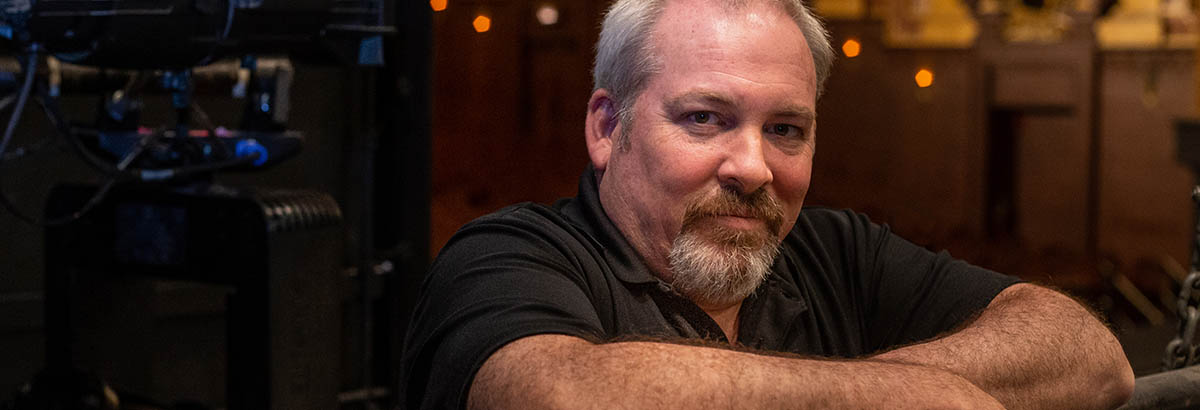September 24, 2019
Backstage Life: John Clarke
Welcome to Backstage Life where we feature the people behind the scenes who make opera happen. Today we're talking to John Clarke, a Lyric Opera stagehand who has been with us since 1986. Here's what he had to say about his life at Lyric.

WHAT IS YOUR ROLE AT LYRIC, AND HOW LONG HAVE YOU HELD THE POSITION?
Broad stroke, I'm a stagehand, and specifically the assistant electrician. I don't know when I became an assistant! I've been here since '86—initially as an apprentice. Back then we had two apprentices in each department, and every seven weeks you'd switch departments so you'd learn a little of everything. I started as a carpenter, when I was done being an apprentice—that was about five years—then the electricians asked me to join their crew. I did, and I've stayed there ever since!
WHAT LED YOU TO WORK AT LYRIC?
I have to give my father credit because he was a stagehand here for 45 years, but he didn't want me to work here! He had higher aspirations for me, but I'd been coming to work with him since I was a little kid and thought it was the coolest thing. He's John Clarke, too. The opportunity came up and I took it. I was 19, maybe just turned 20.
WHAT'S A TYPICAL DAY LIKE FOR YOU?
A typical day is anything but typical! It usually starts with a plan laid the day before that goes completely off the rails. Half my job is working on productions and half my job is keeping a 90-yearold building from falling apart. I get here at 7:30 a.m. every day, and honestly sort of hold my breath when I walk in. I start turning lights on and start looking for whatever went wrong last night. The plan is to strike whatever the show was last night, but more often than it should be there's something that doesn't work or a water leak somewhere or someone came up with an idea at midnight and it's now an emergency! If there's a show or rehearsal to set up onstage, the main thing I have to do is whatever lighting effects, water effects, bleeding floors, etc. needs to be set up—and it's different for every production.
WHAT'S THE MOST CHALLENGING ASPECT OF YOUR JOB?
The most challenging thing is interpreting whatever the director or designer's idea is into something that doesn't exist yet. Example? "I picture the floor bleeding," both for Elektra and for Bel Canto. After the shootings at the end, characters fell and were supposed to bleed from their heads, and we had the blood come up through the floor. Another favorite was the "dancing" water fountain in the most recent Mikado, with the spurts of water synchronized to the music. That's the most challenging part—they say, "I want the water to dance with the music!" and they go away and I've gotta make it work.
WHAT KEEPS YOU COMMITTED TO THE WORK YOU DO?
It's the only job I know of where you get to do cool stuff like that! What really keeps me committed is the opportunity with every production to take an abstract idea and build it from scratch. I get to be as creative as I can and invent things no one has ever seen before. A truly unique way to contribute to an experience that hopefully touches the lives of nearly 3,600 people. And it's fun!
WHAT'S SOMETHING ABOUT YOUR JOB THAT PEOPLE MIGHT NOT KNOW?
Probably that there are places in this building that no one left alive has been in. I've been in every ceiling, wall, and floor space there is within the theater and backstage. There's usually a tiny little knee-shaped hole in the brick...I've had to chisel into time capsules left by the guys who built the building. We still have places with original wiring and piping that needs to be maintained...and the installation of new equipment, too. Like our video wall down there that we hung from a space no one knew existed, over the Opera Club stairs.
A FAVORITE LYRIC MOMENT?
That would have to be when I rode the mountain out for the old Magic Flute—August Everding's production, which put me three feet away from the Queen of the Night during her big aria. That's the first time I really appreciated opera—it made the hair on my neck stand up! I'd been here a couple of years and had never liked opera, because I didn't realize what people could do with their voices. I've gotten to like a lot of it. I'm more of a Verdi, Puccini, Rossini kind of guy, and a lot of the other stuff I like, too.
BEYOND OPERA, WHAT ARE YOUR OTHER PASSIONS?
Whiskey and motorcycles! Whiskey across the board, motorcycles specifically Harley Davidson!
